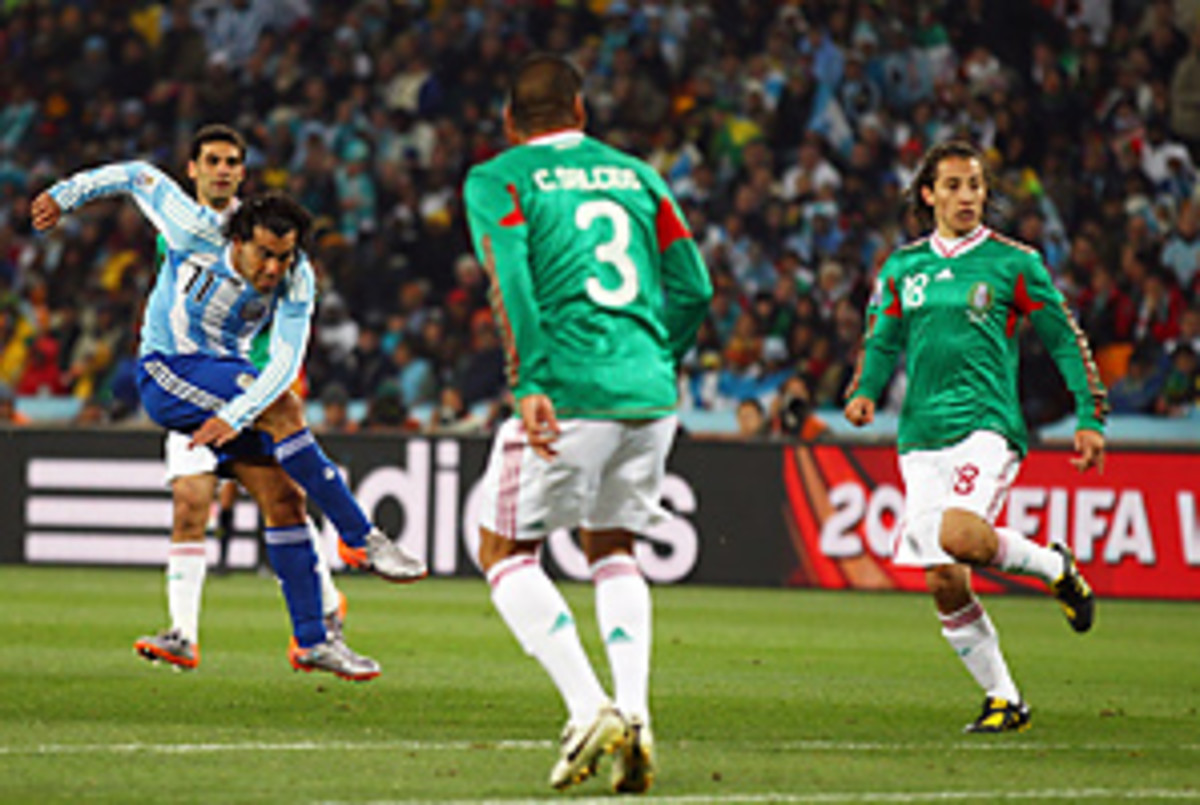In a matchup of similar styles, Argentina proves to be far superior
Mexico started extremely well against Argentina, Carlos Salcido hitting the crossbar with a long-range effort that seemed destined to beat Argentina goalkeeper Sergio Romero, shortly before Andres Guardado's right-foot stab sent the ball inches wide of the far post. Javier Hernandez, too, had an early chance to get his eye in. When Argentina had possession, an organized Mexican side forced it into sideways passes and hungrily chased anything more inventive that threatened to break beyond the back four.
But after 25 minutes, Carlos Tevez scored having received the ball a good two yards offside. When the goal was replayed on the giant screens inside the stadium, the Mexican players bore down on the referee's assistant. Both he and the referee, Roberto Rosetti, could clearly see they had made a mistake, but FIFA rules prevent officials from changing decisions on the basis of big-screen replays and Rosetti, having momentarily appeared to waver, upheld his original decision.
It precipitated a distinct loss of cool in the Mexico side, and it was no surprise to see Argentina take advantage with a second goal inside 10 minutes -- though the mistake from Ricardo Osorio that gift-wrapped Gonzalo Higuain's strike certainly raised a few eyebrows. It was one of several individual errors made by Mexico, though not all of them proved so costly. With Argentina's forwards Higuain, Tevez and Lionel Messi buzzing around, Javier Aquirre's defenders were often far too ponderous in their use of the ball. Even seasoned campaigners such as Francisco Rodriguez found themselves in need of rescue by midfielders like Efrain Juarez, who should have been able to focus their sights in the opposite direction.
Perhaps what proved most costly for Mexico was that when it did go forward -- and there were reasonable spells, particularly at the start of each half, in which Mexico dominated possession of the ball -- it severely lacked penetration. It was forced to play its soccer in front of the Argentine defense, attempting and failing to find the right ball through or resorting to hopeful shots from distance. Both sides fired off six shots on target, but Mexico attempted 16 to Argentina's 11. It was like watching a relay team going into the handover in gold medal position, only to find itself relying on a shot-putter in the last leg. With his goal in the 71st minute, Hernandez showed that he was more than capable of a clinical finish -- rolling off Nicolas Otamendi and onto an through ball from Gerardo Torrado, but it was an incident of isolated incisiveness.
On paper, these two teams play similar soccer, Mexico having been praised for its up-tempo menace and comfort in possession in the group stage. Though there was probably greater need for Mexico to seize the initiative than for Argentina to attempt to dominate the game early on, both teams depend on the sense of uneasiness they instil in opposition goalkeepers. Having been rattled by Tevez's goal (which was created by a slide-rule pass from Messi initally and a delicate attempt to chip the ball over the defense after) Mexico took on the complexion of a tribute band booked onto the same bill as the original.
Argentina was neat and well-organized; Maxi Rodriguez and Otamendi kept Adolfo Bautista out of the game and allowed Pablo Barrera, his halftime replacement, few opportunities to create anything from the wing. The same fate befell Giovani dos Santos, one of Mexico's most exciting players in the tournament, on the opposite flank. There cannot be many teams able to field a player of Messi's talents that can also afford for him to have the relatively quiet game he had today -- a 92nd-minute shot that forced Oscar Perez to rock onto his heels was virtually all Messi-watchers had to write home about in the second half. Instead Tevez took up the cudgel, and his second (Argentina's third) was a strike that married thunderous power with exquisite control.
People continue to question Argentina's defense but on the evidence of today this looks to have even less basis on empirical evidence than ever: Diego Maradona's men have only conceded two goals in four matches. Martin Demichelis goofed against South Korea and Otamendi was beaten by Hernandez today; individually, these are probably not players most international coaches envy. But they operate as more than the sum of the parts, holding their shape and playing the ball out with a calmness fostered by the support of a midfield that stays close when need be. It seems perverse to highlight last-minute interventions -- in particular Gabriel Heinze's diving header to prevent Rafael Marquez reaching a cross at the back post today -- as indications of defensive weakness.





